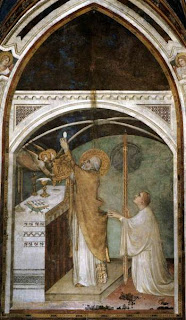Author Archives: Danny
Martin Luther on the Church Fathers on the Real Presence of Christ in the Eucharist
“Of all the fathers, as many as you can name, not one has ever spoken about the sacrament as these fanatics do. None of them uses such an expression as, ‘It is simply bread and wine,’ or ‘Christ’s body and blood are not present.’ Yet this subject is so frequently discussed by them, it is impossible that they should not at some time have let slip such an expression as, ‘It is simply bread,’ or ‘Not that the body of Christ is physically present,’ or the like, since they are greatly concerned not to mislead the people; actually, they simply proceed to speak as if no one doubted that Christ’s body and blood are present. Certainly among so many fathers and so many writings a negative argument should have turned up at least once, as happens in other articles; but actually they all stand uniformly and consistently on the affirmative side.â€
-Martin Luther
